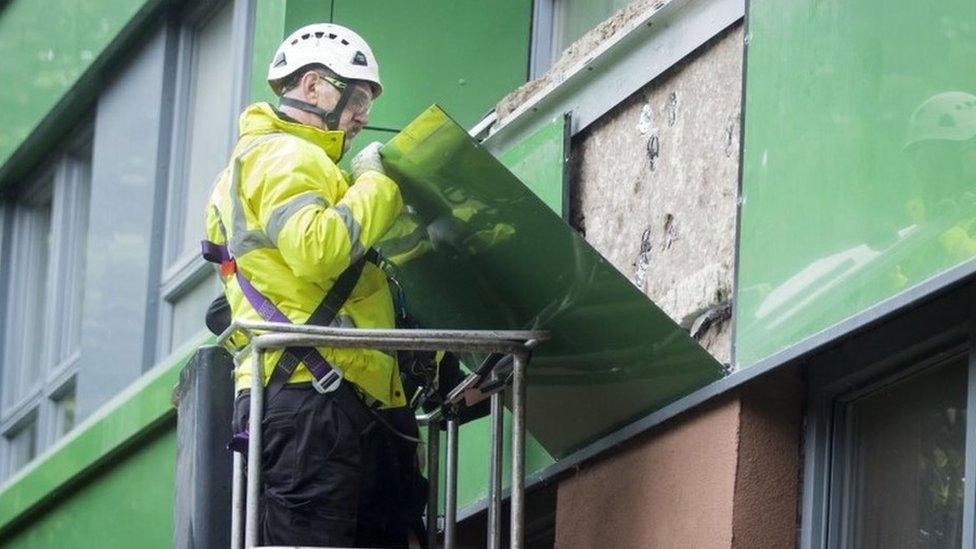Dangerous cladding: 'Fire patrols at our flats cost us £500,000'
- Published
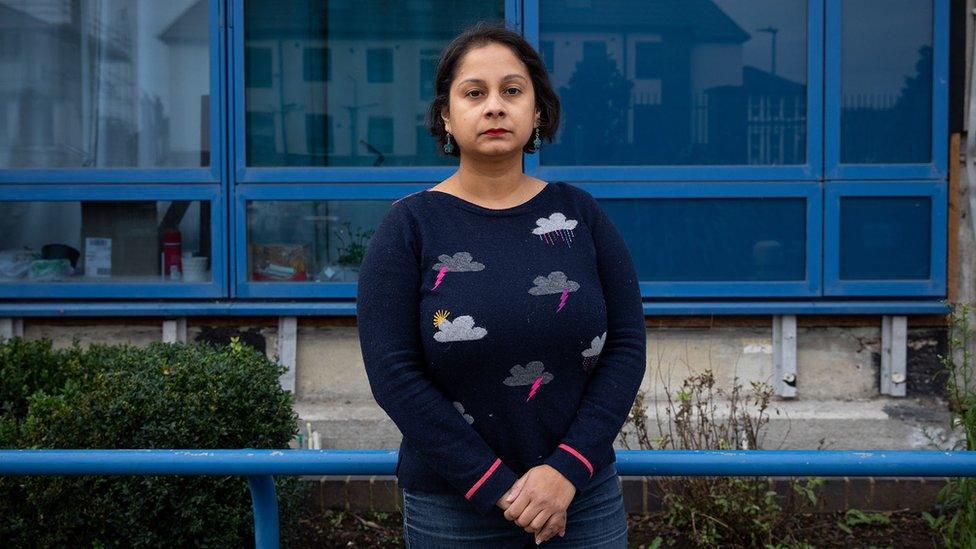
Ritu Saha and fellow residents in Bromley organised their own fire patrols but still had to pay £500,000 between them
Three years after the Grenfell fire, many buildings with dangerous cladding still have 24-hour fire safety patrols - introduced originally as a temporary measure. Now, thousands more homeowners are being forced to pay for "waking watches" with no end in sight.
In November 2017, when people in high-vis jackets arrived at Ritu Saha's block in Bromley, south-east London, she was told not to worry: they'd be gone by January.
Three years and about £500,000 of charges to flat owners in the block later, they are still there.
Most of the cladding - the type that caused the Grenfell fire to spread so fast, killing 72 people - has been removed from Ritu's flat.
But entire walls would need to be demolished to clear it away entirely, Ritu says.
The contractors suggest the task is too difficult, and the remaining cladding may have to stay, along with other safety measures to prevent a deadly fire. The fire brigade says that could mean the waking watch has to stay.
"Will we have these fire wardens for the rest of our lives?" Ritu asks. The patrols have already cost her, on average, more than £300 a month for the last three years, totalling £11,700.
£137average monthly cost to a flat owner
£256the average in London
£14average hourly rate earned by fire warden - though some earn up to £30p/h
A university administrator and one of the founders of the UK Cladding Action Group, she says she cannot bear the cost much longer - "I will be ruined, basically, if that happens."
Costs for the fire patrols vary hugely, with flat owners often saying they are imposed with little notice or consultation.
Government research suggests the typical flat owner pays £137 a month, or £256 in London - about £11,000 to £15,000 per block each month. Fire wardens are mostly paid around £14 an hour - but some earn up to £30 an hour, the government says.
And the number of affected buildings continues to rise: in London, 573 blocks now have the patrols, up from 286 in March.
One flat owner in east London tells the BBC the waking watch introduced at his block in July costs the equivalent of £1,300 per flat every month. At the moment, the bill is being paid by the housing association, but he says if the costs cannot be recovered from the original developer or through the building warranty, leaseholders will be charged.
The leasehold system in England and Wales means many flat owners do not own their property outright, but instead buy the right to use it for a fixed period of time - often between 99 and 125 years.
Their buildings are owned by a freeholder, who charges them a small annual rent, plus money for repairs - which can mean huge bills for issues such as cladding.
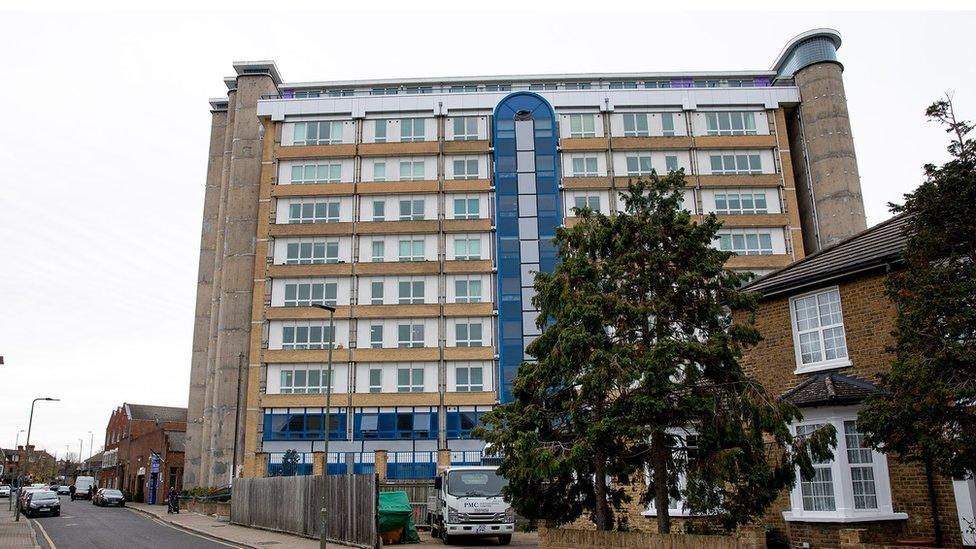
After three years, contractors say some of the flammable material on this building may be to difficult to remove
"The buck keeps being passed between each body," the flat owner says. "What are they trying to do to leaseholders? Are they really trying to bankrupt us?"
Some residents have organised their own waking watch to reduce the cost, with volunteers covering many of the shifts, sometimes in the face of opposition from insurers.
Ritu says she would rush home from work to start her 19:00 to midnight shift. A retired woman in her block would take some of the night shifts, staying up from midnight to 07:00 three nights a week to watch for signs of a blaze.
'People will lose their homes'
A fire alarm can be fitted for the same average cost as just seven weeks of waking watch, government research suggests. But in practice it rarely works out that way: many leaseholders are required by the National Fire Chiefs Council to maintain patrols so they can help evacuate the building in the event of a fire.
Ritu now has eight highly sensitive smoke and heat detectors scattered around her one-and-a-half bedroom flat, frequently setting off false alarms.
But fitting the system - which cost leaseholders £120,000 - only allowed residents to reduce their waking watch from two people to one, still leaving them a £12,000 monthly bill between them.
Matt Browne and Lizzie Bennett are among thousands of flat owners who discovered in the last year they lived in a dangerous block that would require 24-hour fire patrols when they tried to sell.
Their estate agent told them their building, in Birmingham city centre, had failed its external wall fire review, known as EWS1.

Birmingham flat owners Lizzie Bennett and Matt Browne say the costs are "unfathomable"
The review process - demanded by lenders - was extended to many more buildings in January this year with a change of government guidance. Blocks that fail because of dangerous cladding, like Matt and Lizzie's, are valued at £0, cannot be mortgaged and are almost impossible to sell.
Since then, their building's service charge has risen from £950 every six months to £4,629 to pay for a £17,000-a-month waking watch, a £150,000 alarm system (not yet installed) and a 300% increase in insurance bills.
"It's unfathomable, you can't really wrap your head around the idea that it costs this much to live in a one-bedroom flat," says Lizzie, a primary school teacher.
She has suffered anxiety and sleeplessness over the mounting costs, but says: "It's been a constant battle of trying to keep it together because I can't show emotion at work, I have to be there for the children."
Like many leaseholders, they hope their building wins some of the £1.6bn of government funding to remove dangerous cladding when applications close this month. But Matt says the Building Safety Fund is "nowhere near big enough" to meet demand.
The 26-year-old video producer has been exhausted by the process after six months. "I know people have been fighting this for years already," he says. "We are at a stage now where in the next year you will start seeing people go bankrupt and people will start losing their homes."
In 2019, solicitor Peter Tolson signed up to help run his block's management company in order to push forward some minor repairs.
He's seen the impact the charges have had on fellow residents - some have lost their jobs in the pandemic - since the flats in east London failed their EWS1 earlier this year.
"We had people literally banging on our doors, crying, banging the door down at this thought of paying a grand or two grand a month to pay for waking watch on top of insurance costs," he says.
They have since reduced the costs by arguing they did not need such extensive patrol coverage. But residents have nicknamed the waking watch "the Wombles" and don't regard them as a serious safety measure.
Residents complain the wardens just sit around, Peter says. He questions the likelihood of them being in just in the right spot at the right time when a fire is visible behind a flat door with time still to evacuate.
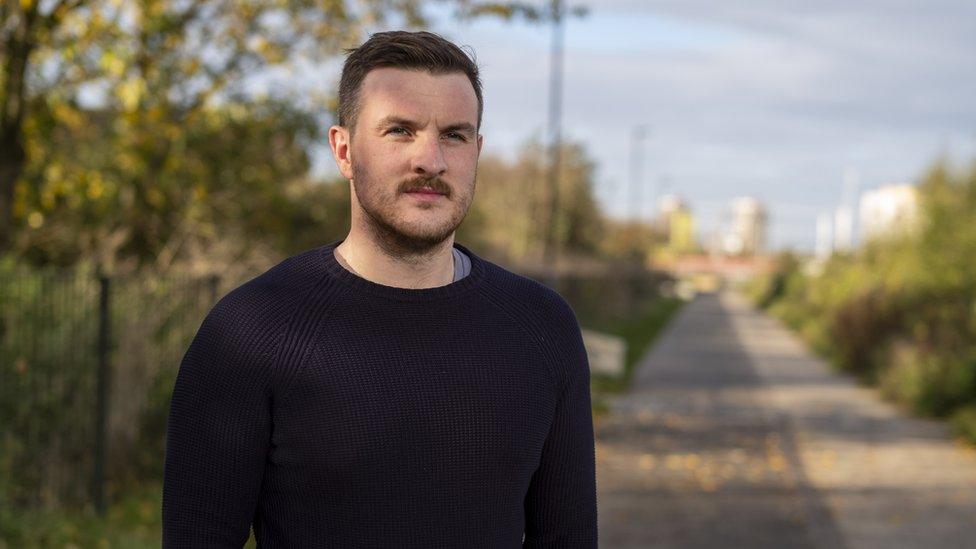
Peter Tolson said residents who lost their jobs in the pandemic have been in tears at the bills
Meanwhile, each week more flat owners discover they are in the same situation. Olivia Hill, a PhD student, helped form the Sheffield Cladding Action Group after discovering her block had failed its assessment last month.
She says residents face an uncomfortable choice between protection from the dangers of fire and letting strangers into their building. "I live on my own, I'm a young woman, it's easy to feel unsafe," Olivia says.
Having done all the due diligence when she purchased it last year, she was shocked to discover potentially deadly faults are still being discovered in buildings more than three years after Grenfell.
"It's been going on so long and potentially there's no end in sight," Olivia says. "It could keep going on that long for us."
The Ministry of Housing, Communities and Local Government said waking watches should only be used "as an interim measure", adding: "They are not a substitute for the swift removal of unsafe cladding.
"Where leaseholders have concerns about waking watch costs they should speak to their building owner, who is responsible for putting safety measures in place. Leaseholders can also challenge excessive costs at the First Tier Tribunal."
The government on Thursday announced a £30m fund to help pay for the installation of common fire alarms in affected buildings, to end what it called the "scandal" of excessive waking watch costs.
Related topics
- Published17 December 2020
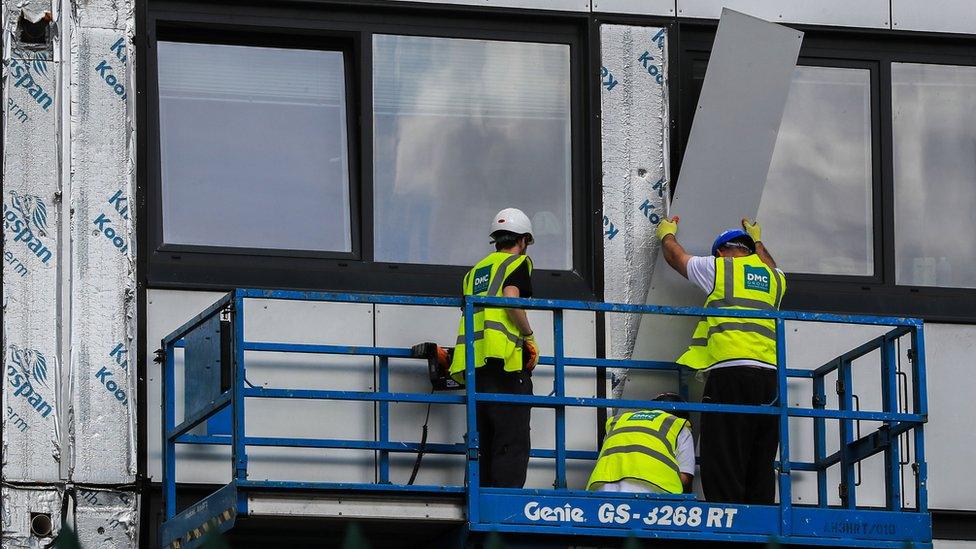
- Published21 November 2020
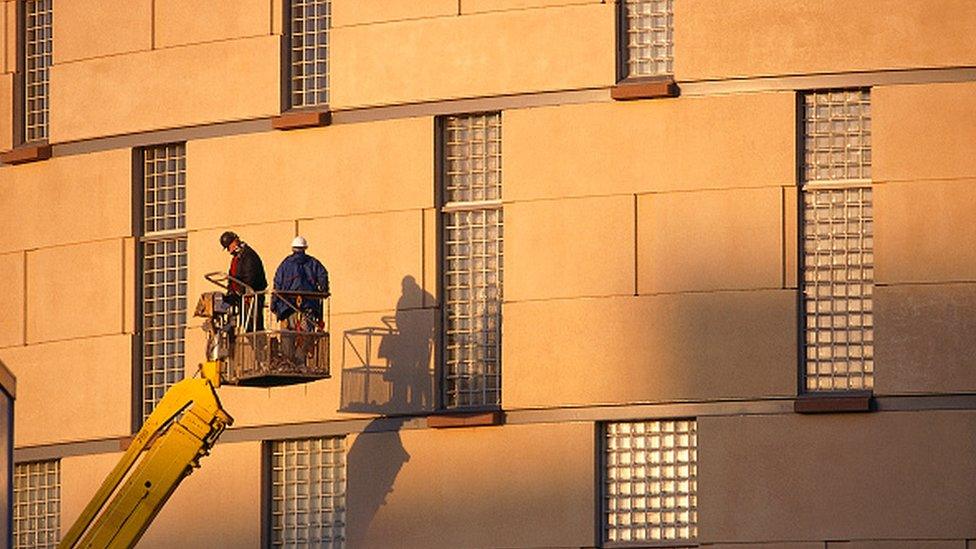
- Published8 February 2020
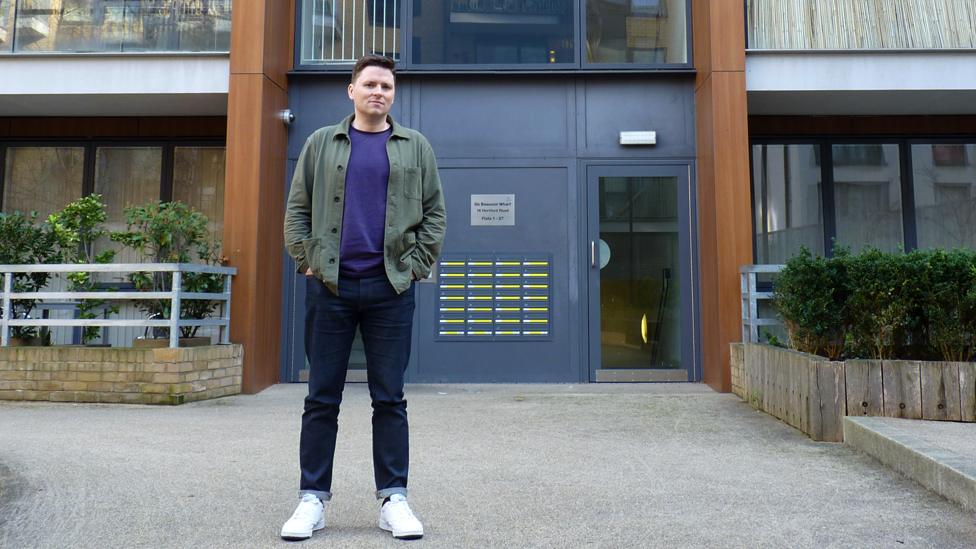
- Published20 October 2020

- Published24 November 2020
